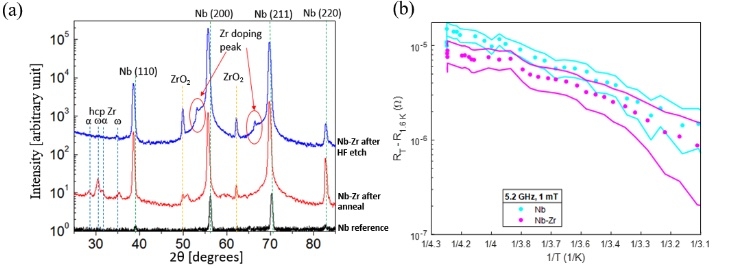Patent Application: “Ordered, cubic β-ZrNb alloys with high critical temperature in the theoretical limit, method of making same, and use for superconducting applications"
Inventors: Zeming Sun, Thomas Oseroff, Matthias Liepe
Invention Summary
The proposed invention represents novel methods for forming ordered, cubic β-ZrNb alloyed surfaces that yield high critical temperatures in the theoretical limit and improved superconducting properties desirable for superconducting radio-frequency (SRF) and quantum computing applications.
Technology Overview
The superconducting properties of SRF cavities used in the particle accelerators and future quantum computers depend on the surface material and the associated crystal structure and composition. The proposed method uses a novel ZrNb alloyed surface for SRF cavity, providing two distinct benefits, namely
1. Achieving critical temperature, Tc, as high as 16 K, thus, minimizing energy dissipation and cryogenic costs, and
2. Enhancing critical field, Bc, thus, allowing improved accelerating gradients.
These benefits make it possible to design energy efficient and compact particle accelerators and quantum computers. Formation of ZrNb surface can be achieved via either physical vapor deposition of Zr on Nb surface or an electrochemical reaction of ZrF4 with Nb surface, followed by thermal annealing under vacuum and subsequent HF etch. Tc values from ZrNb alloys made by both methods are essentially higher than Nb and sputtered ZrNb thin films or their random alloys in past studies. Figure 2 shows the 5.2 GHz low-field BCS surface resistance trends lower for Nb-Zr alloy than Nb, which is consistent with the expected benefit of the high Tc of the Nb-Zr material.
References:
Z. Sun, T. Oseroff, M. Liepe, “Ordered, cubic β-ZrNb alloys with high critical temperature in the theoretical limit, method of making same, and use for superconducting applications," U.S. Provisional Application, SN 63/383,387 filed on 11/11/ 2022.
Z. Sun, T. Oseroff, Z. Baraissov, D. K. Dare, K. Howard, B. Francis, A. C. Hire, N. Sitaraman, T. A. Arias, M. K. Transtrum, R. Hennig, M. O. Thompson, D. A. Muller, and M. U. Liepe, “ZrNb(CO) RF Superconducting Thin Film with High Critical Temperature in the Theoretical Limit,” Advanced Electronic Materials, vol. n/a, no. n/a, p. 2300151, Jun. 2023, doi: 10.1002/aelm.202300151
N. S. Sitaraman, Z. Sun, B. Francis, A. C. Hire, T. Oseroff, Z. Baraissov, T. A. Arias, R. Hennig, M. U. Liepe, D. A. Muller, and M. K. Transtrum, “Theory of Nb-Zr Alloy Superconductivity and First Experimental Demonstration for Superconducting Radio-Frequency Cavity Applications,” Aug. 2022, doi: 10.48550/arXiv.2208.10678. [Online]. Available: http://arxiv.org/abs/2208.10678

